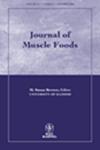MYOFIBRILLAR AND SARCOPLASMIC PROTEIN OXIDATION AND DEGRADATION OF THIN-LIPPED GRAY MULLET (LIZA RAMADA) DURING REFRIGERATED STORAGE (4C)
Abstract
ABSTRACT
The oxidation of myofibrillar and sarcoplasmic proteins of thin-lipped mullet (Liza ramada) in different ages during refrigerated storage (4C), and in vitro oxidation of muscle after 2 and 24 h incubation with Fe+2/H2O2 at 4C were evaluated by means of protein carbonyl content. Changes in myofibrillar and sarcoplasmic proteins were estimated by sodium dodecyl sulfate-polyacrylamide gel electrophoresis. The carbonyl content of myofibrillar proteins exhibited a regular increase at 2 years of age during the refrigerated storage for 10 days (P < 0.05), and increased at 4 and 6 years of age after 5 days of cold storage (P > 0.05), and then did not significantly change between 5 and 10 days of storage (P > 0.05). Sarcoplasmic proteins showed a decrease in the carbonyl content at 2 years of age during 10 days of storage. However, no significant changes were observed in carbonyl content of sarcoplasmic proteins at 4 and 6 years of age (P > 0.05). An increase in carbonyl content of whole muscle, but not statistically significant, was found at 2, 4 and 6 years of age during 10 days of cold storage. There were no significant differences in oxidation of thin-lipped gray mullet proteins in all ages between 2 and 24 h of incubation with Fenton-like oxidation system (Fe+2SO4/H2O2) at 4C (P < 0.05). However, there was a tendency to find an increase in carbonyl content in all ages after 24 h of incubation. Electrophoretic studies in the presence and absence of β-mercaptoethanol showed that high-molecular weight polymers via disulfide cross-linking and/or degradation/digestion by proteolysis could be formed in the myofibrillar proteins in different ages. Slight changes were observed in sarcoplasmic proteins of thin-lipped gray mullet both in the absence and presence of a disulfide-splitting agent. These results suggest that there is a probable link between protein oxidation and protelytic degradation of myofibrillar proteins during postmortem storage, and the effects of cold storage on oxidation and possible changes in myofibrillar and sarcoplasmic proteins could be changed depending on ages in same species.
PRACTICAL APPLICATIONS
The degradation of muscle proteins caused by proteolysis is one of the most important quality attributes of fish muscle throughout cold storage. However, knowledge about the effect of oxidative process on proteins and their effect on postmortem quality of fish is less known. In this study, we found a probable link between protein oxidation and degradation of thin-lipped mullet myofibrillar proteins, and their proteolysis may be stimulated by oxygen radicals during postmortem storage. These determinations are important to prevent protein degradation and improve the shelf life of thin-lipped mullet during postmortem storage.

 求助内容:
求助内容: 应助结果提醒方式:
应助结果提醒方式:


